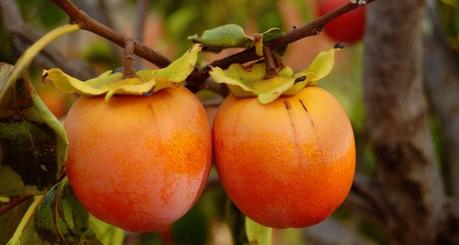OVERVIEW:
You will all be familiar with most of the fruits available in the market, but there are some of these colorful fruits, which hardly everyone knows about. One of them is persimmon (tendu) fruit. The minerals and vitamins present in this delicious fruit enable us to keep many serious diseases away from us. Keeping these specialties, in this article, we are going to reveal some interesting facts related to the benefits and uses of persimmon fruit, so that we can get the best benefits.
Tendu fruit can help protect against various physical problems as well as reduce some of the symptoms in the stage of illness.
WHAT IS PERSIMMON FRUIT?
Persimmon is a fruit similar to tomato, which is found in India mainly on the Vindhyachal hills touching Uttar Pradesh and Madhya Pradesh. In 2019, China produced 75 percent of the world total of persimmons.
This fruit appears in yellow, red and orange color and is round in shape. At the same time, if we talk about the width, then its diameter can be seen from 0.5 to 4 inches. Ripe persimmon fruit is juicy and sweet in taste, which looks like a mixture of dates and plums in food. At the same time, if we talk about raw fruits, then its taste feels bitter and astringent.
PERSIMMON FRUIT NUTRITIONAL FACTS:

According to the Food Data Central, per 100g serving of fresh raw persimmon fruit contains:
- Energy: 70 kcal
- Protein: 0.58 g
- Total Lipid: 0.19 g
- Carbohydrate: 18.6 g
- Calcium: 8 mg
- Magnesium: 9 mg
- Phosphorus: 17 mg
- Potassium: 161 mg
- Sodium: 1 mg
- Zinc: 0.11 mg
- Copper: 0.113 mg
- Manganese: 0.355 mg
- Vitamin C: 7.5 mg
- Thiamin: 0.03 mg
- Riboflavin: 0.02 mg
- Niacin: 0.1 mg
- Vitamin B6: 0.1 mg
- Folate: 8 µg
- Vitamin A: 81 µg
- Vitamin E: 0.73 mg
- Vitamin K: 2.6 µg
- Cholesterol: 0 mg
- Fatty acids, total monounsaturated: 0.037 g
- Fatty acids, total polyunsaturated: 0.043 g
HEALTH BENEFITS OF PERSIMMON FRUIT:

1. Good Source of Antioxidants:
According to experts, phenolic acids, catechins, amino acids as well as phenolic and flavonoid elements are found in tendu fruit juice, which combined make it an excellent antioxidant. Oxidative stress increases the risk of many problems like arthritis, diabetes, inflammation and heart disease. For this reason, it can be assumed that in all these problems, tendu fruit can exhibit a positive effect to a great extent.
2. Rich in Fiber:
Along with other nutrients, fiber is found in abundance in persimmon (tendu) fruit. Fiber helps control weight, improve digestion as well as considered beneficial to overcome problems like constipation. For this reason, it can be said that being a good source of fiber, tendu fruit can also prove to be helpful in getting rid of all these problems.
3. Persimmon for Heart Health:
According to health experts, two special elements called carotenoids and tannins are found in persimmon (tendu) fruit. These two elements help in controlling cardiovascular risks such as high blood pressure and cholesterol by removing the effects of free radicals. For this reason, it can be said that the use of tendu fruit can prove beneficial for heart health.
4. Reduce Inflammation:
A research conducted by the University of Lisbon Medicine and Pharmaceutical Sciences on persimmon fruit stated that the extract of this fruit has some anti-inflammatory effects. Due to this effect, it helps in relieving the problem of arthritis.
Along with this, it can also prove to be helpful in relieving the problem of other common inflammation and pain caused by it.
5. Control Blood Sugar:
Due to the presence of polyphenols, persimmon fruit has anti-oxidants and anti-diabetic effects. Oxidative stress is also one of the main causes of high blood sugar. For this reason, both these effects of tendu fruit can help in reducing high blood sugar naturally. For this reason, it would not be wrong to say that persimmon or tendu fruit can prove to be a great option to get rid of the problem of blood sugar.
6. Persimmon for Weight Loss:
The benefits of persimmon fruit can also been seen in reducing weight. High amount of fiber is found in this fruit, which does not allow you to feel hungry for a long time. By consuming it, you feel less hungry and you eat less. By consuming it regularly in limited quantity for some time, you can easily lose weight. Not only this, thiamine, riboflavin and phosphorus are also found in it, which are very helpful in reducing weight.
7. Beneficial for Eyes:
According to a scientific research, consuming persimmon fruit can help keep eyes healthy. The presence of vitamin A in this fruit helps in improving eyesight as well as reducing the risk of myopia. Not only this, an element called lutein is present in it to fight eye problems. Therefore, if your eyesight is weak or if the lenses are not removing, then you can consume this fruit according to the advice of a doctor.
HOW TO USE PERSIMMON FRUIT:

Let us now know about how persimmon fruit can be used. It can be used in many ways; including:
- Persimmon fruit can be mixed with other fruits and eaten as a fruit salad.
- A glass of persimmon fruit juice can be consumed with breakfast in the morning.
- At the same time, this fruit can also be eaten raw.
- Persimmon fruit can also be used to make smoothies and ice creams.
- Apart from this, persimmon fruit shake can also be made by mixing it with other fruits.
SIDE EFFECTS OF PERSIMMON FRUIT:
Although there is not much information available about the side-effects caused by the excessive consumption of persimmon fruit, but there are some side-effects. Some of the side-effects of persimmon fruit include:
- Tendu fruit is a good source of fiber. Therefore, excessive consumption of it can cause problems of acidity, pain and cramps in the stomach.
- Due to the anti-diabetic effect, its high use in people taking diabetic medicines can cause the problem of low blood sugar.
- Individuals who are prone to excessive consumption or are allergic to the fruit should avoid the consumption of this fruit. This can also cause allergies in them.
- According to the scientific studies done on insects, consuming persimmon fruit in large quantities can cause reproductive problems.
TAKE AWAY
Now you must have come to know about what is persimmon fruit and what are the benefits of using persimmon fruit. At the same time, through the article, you have also learned about its uses and side-effects. If you liked this article, do not forget to share it with others and if you have any question or suggestions, please leave in the comment box below.
REFERENCES:
- Anti-inflammatory Effects of Persimmon ( Diospyros kaki L.) in Experimental Rodent Rheumatoid Arthritis; Rosa Direito, João Rocha, Ana-Teresa Serra and Adelaide Fernandes; PMID: 31359802.
- Persimmon, Wikipedia.
- Persimmon (Diospyros kaki) fruit: hidden phytochemicals and health claims; Masood Sadiq Butt, M. Tauseef Sultan, Mahwish Aziz and Ambreen Naz; PMCID: PMC4817420. PMID: 27047315.
- Persimmons japanese raw; FoodData Central.
- Comparative Studies of Antioxidant Activities and Nutritional Constituents of Persimmon Juice (Diospyros kaki L. cv. Gapjubaekmok); Jin Hwan Lee, Yong Bok Lee, Woo Duck Seo and Su Tae Kang; PMCID: PMC3866757. PMID: 24471076.
- Dietary Fiber, Medline Plus.
- Oxidative Stress and Neurodegenerative Diseases: A Review of Upstream and Downstream Antioxidant Therapeutic Options; Bayani Uttara, Ajay V. Singh, Paolo Zamboni and R.T Mahajan; PMCID: PMC2724665. PMID: 19721819.
- Effects of purified persimmon tannin and tannic acid on survival and reproduction of bean bug Riptortus clavatus; Chung Gyoo Park, Kyu Chul Lee, Dong Woon Lee, Ho Yul Choo and P J Albert; PMID: 15672670.

